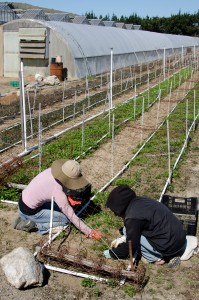NOTE: Puente is writing about the lives of female farm workers for National Farmworker Awareness Week. This is the first of two stories.
 When Maricela Garcia came to Pescadero as a newlywed, it seemed like a verdant paradise – a beautiful place to earn American dollars instead of Mexican pesos. Here, she and her husband Ruben could work side-by-side in fields by the sea, raise children, and eventually build a house of their own – if they could afford it. She didn’t count on the farm work being so difficult, and the cost of living so high.
When Maricela Garcia came to Pescadero as a newlywed, it seemed like a verdant paradise – a beautiful place to earn American dollars instead of Mexican pesos. Here, she and her husband Ruben could work side-by-side in fields by the sea, raise children, and eventually build a house of their own – if they could afford it. She didn’t count on the farm work being so difficult, and the cost of living so high.
“It was pretty, all right. But it was really hard because I had never worked in the fields before,” says Garcia.
The 43-year-old was no stranger to hard work. She started at the age of 9, cleaning houses and selling fruits and vegetables in her town in the Mexican state of Jalisco – anything that would bring a few pesos home to her younger sisters and brothers. Their mother left when she was small and their father was an alcoholic. So she dropped out of school in the fourth grade and did what she could.
But her early struggles did not prepare Garcia for working in the flower industry. She and Ruben did find work together at a local nursery alongside other immigrants. But the conditions were very tough to take. “It was really hot, working in the sun. You’re up and down on your knees a lot. When it rained we still had to work outside, so we were always getting wet. On the rainy days your whole body got wet. You’re always bent over or lying down planting.”
 But they didn’t speak much English, and Garcia doesn’t drive. With limited options, the couple kept at it. In an industry with very few certainties, they stayed with the same company for 23 years. They became legal residents. They had four children and sent two of them to college.
But they didn’t speak much English, and Garcia doesn’t drive. With limited options, the couple kept at it. In an industry with very few certainties, they stayed with the same company for 23 years. They became legal residents. They had four children and sent two of them to college.
In all those years, the most she was paid was $9.25 an hour. The California minimum wage is $9 an hour.
They never did make enough money to build that family home, but their two-bedroom apartment is adequate, she says.
“My children are very rich compared with my life in Mexico. They’ve never wanted for food. They have their parents who love them and take care of them.”
Fortunate by Mexican standards, but Maricela and Ruben weren’t earning enough to cushion them against losing both their farm jobs suddenly in January. They came home from a vacation in Mexico to the bad news.
As she speaks, Garcia becomes emotional. Her face flushes and she starts to cry. She knows the layoff was not personal, but she and her husband can’t help feeling let down after 23 years of employment.
“It’s because of the industry. I can tell that work has been going down. There’s been less and less of it,” she says, her gray-streaked ponytail bobbing as she retrieves a Kleenex from her purse.
The layoffs are not as surprising in the context of San Mateo County’s weakening farm industry, where agricultural production shrank 22 percent between 2001 and 2011, from $177 million to $137 million. And the catastrophic drought makes it unlikely the industry will recover any time soon. In 2014 alone, the drought cost the industry $2.2 billion and led to 17,000 layoffs, according to a study from UC Davis.
Garcia and her family are longtime, cherished members of the Puente community. Her two eldest daughters, Mariela and Diana, were part of Puente’s youth leadership development program. Mariela, 22, recently graduated from Cal State Monterey Bay, an endeavor that Puente supported through scholarships for expenses like books and tuition. She’s now waiting to hear whether she has been admitted to San Jose State, where she wants to pursue a second degree in social work. Diana, 19, has also received higher education scholarships from Puente. She is enrolled in community college and hopes to become a law enforcement officer.
Garcia herself is at Puente at least twice a week. She helps run Puente’s childcare program for young children on Tuesdays and Thursdays while their mothers do Zumba, and works with students in Puente’s Homework Club. She’s quick to read with a student or assist a child in coloring, and is known for her gentle and nurturing manner. Her youngest children prefer to come with her to Puente, whether they need help with homework or not.
Her Puente salary helps her family pay the rent, but Garcia knows time is running out to find another farm job. She and Ruben want to find a job where they can work side-by-side, which could make it hard to stay on the South Coast altogether. And hopefully one that pays more than $9.25 an hour.
She sounds resigned as she considers her next move. “The kids understand we have to look for other work, and if we can’t find other work we may have to go somewhere else.” Her twin 10-year-olds, in particular, still need their parents very much.
Please consider supporting our local farm workers with a gift to Puente to help us meet their needs. Click here for more information. You can also take action on behalf of farm workers by clicking here.



